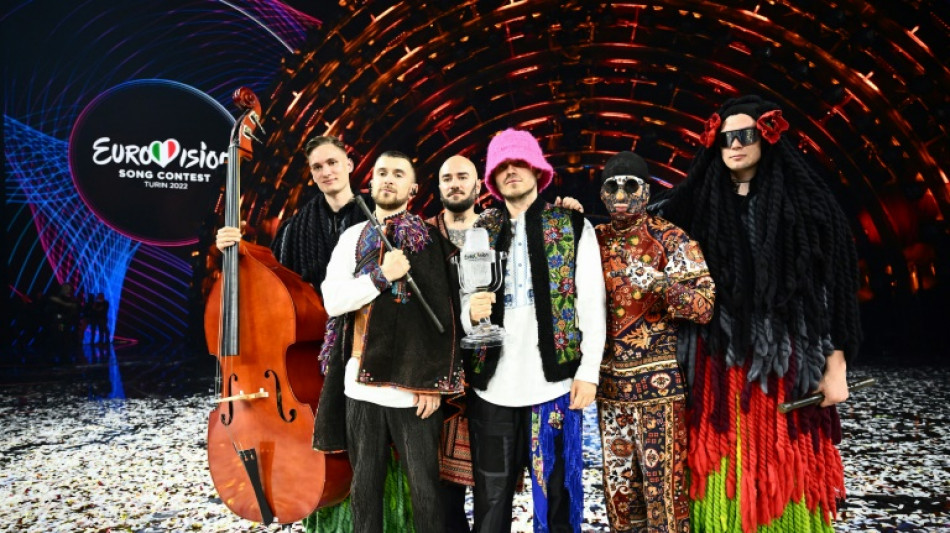

Ukraine folk rappers boost war morale with Eurovision triumph
Ukraine won the Eurovision Song Contest Sunday with an infectious hip-hop folk melody, as the embattled nation rides a wave of public support across Europe.
Kalush Orchestra beat 24 competitors in the finale of the world's biggest live music event with "Stefania", a rap lullaby combining Ukrainian folk and modern hip-hop rhythms.
"Please help Ukraine and Mariupol! Help Azоvstal right now," frontman Oleh Psiuk appealed in English from the stage, referring to the port city's steelworks where Ukrainian soldiers have been surrounded by Russian forces for weeks.
Following the win, Psiuk -- whose bubblegum-pink bucket hat has made him instantly recognisable -- thanked everyone who voted for his country in the contest, which is watched by millions of viewers.
"The victory is very important for Ukraine, especially this year. Thank you from the bottom of our hearts. Glory to Ukraine," Psiuk told journalists.
- Music conquers Europe -
The win provided a much-needed morale boost for the embattled nation in its third month of fighting off a Russian invasion.
"Our courage impresses the world, our music conquers Europe!" Ukrainian President Volodymyr Zelensky wrote on Facebook.
The win drew praise in unlikely corners, as the deputy chief of the NATO military alliance said it showed just how much public support ex-Soviet Ukraine has in fighting off Moscow.
"I would like to congratulate Ukraine for winning the Eurovision contest," said NATO's number two and Romanian President Mircea Geoana, as he arrived in Berlin for talks that will tackle the alliance's expansion in the wake of the Kremlin's war.
"And this is not something I'm making in a light way because we have seen yesterday the immense public support all over Europe and Australia for the bravery of" Ukraine, Geoana said.
British Prime Minister Boris Johnson called the win "a clear reflection of not just your talent, but of the unwavering support for your fight for freedom".
And European Council President Charles Michel said he hoped next year's contest "can be hosted in Kyiv in a free and united Ukraine".
Ukraine beat a host of over-the-top acts at the kitschy, quirky annual musical event, including Norway's Subwoolfer, who sang about bananas while dressed in yellow wolf masks, and Serbia's Konstrakta, who questioned national healthcare while meticulously scrubbing her hands onstage.
Coming in second place was Britain with Sam Ryder's "Space Man" and its stratospheric notes, followed by Spain with the reggaeton "SloMo" from Chanel.
- 'Ready to fight' -
Despite the joyous theatrics that are a hallmark of the song contest, the war in Ukraine hung heavily over the festivities this year.
The European Broadcasting Union, which organises the event, banned Russia on February 25, the day after Moscow invaded its neighbour.
"Stefania", written by Psiuk as a tribute to his mother before the war, mixes traditional Ukrainian folk music played on flute-like instruments with an invigorating hip-hop beat. The band donned richly embroidered ethnic garb to perform their act.
Nostalgic lyrics such as "I'll always find my way home even if all the roads are destroyed" resonated all the more as millions of Ukrainians have been displaced by war.
Kalush Orchestra received special authorisation from Ukraine's government to attend Eurovision, since men of fighting age are prohibited from leaving the country, but that permit expires in two days.
Psiuk said he was not sure what awaited the band as war rages back home.
"Like every Ukrainian, we are ready to fight as much as we can and go until the end."
- Britain's 'Space Man' -
Other contenders at Eurovision included Sweden's break-up belt "Hold Me Closer" from Cornelia Jakobs, Greece's sombre "Die Together" by Amanda Georgiadi Tenfjord, and "Brividi" (Shivers), a gay-themed duet from Italy's Mahmood and Blanco.
Italy won the competition last year with "Zitti e Buoni" (Shut up and Behave) from high-octane glam rockers Maneskin, who performed their new single "Supermodel" during Saturday night's finale.
Eurovision's winner is chosen by a cast of music industry professionals -- and members of the public -- from each country, with votes for one's home nation not allowed.
After a quarter-century of being shut out from the top spot, Britain had hoped to have a winner in "Space Man" and its high notes belted by the affable, long-haired Ryder.
Eurovision is a hit among fans not only for the music, but for the looks on display and this year was no exception. Lithuania's Monika Liu generated as much social media buzz for her bowl cut hairdo as her sensual and elegant "Sentimentai".
(Y.Rousseau--LPdF)




